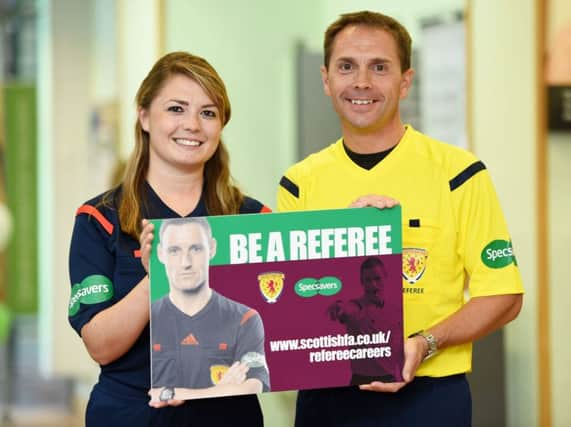Vikki Allan out to prove women can referee top games


For the first time ever, all this weekend’s SWPL matches will be controlled by women.
“It is a huge thing,” says Vikki Allan, who will take charge of the Hibs v Spartans capital derby. “I have been involved since I was 16 and I’m now 23 and in that time I have seen a big change. It’s a massive difference to have so many involved and that comes from the support we get from the SFA, not just from the refereeing department, and from the clubs. I think attitudes have changed a lot.”
Advertisement
Hide AdAdvertisement
Hide AdThese days there are 128 female officials registered, of whom 43 are actively involved on a week-to-week basis in matches up and down the leagues, throughout the country. As referees, they still suffer abuse, and barracking from the sidelines is regular, but the reassuring thing is that gender is becoming less of an issue.
“That’s one of the differences I have noticed in the last couple of years. I don’t think of myself as a female referee any more, I’m just a referee and I think that is the same for most people when I’m doing a game. Maybe they see it as something different at the start of a match, but after about 20 minutes I’m treated the same as any other referee.”
Her parents know just how tough it can be. Her dad is Crawford Allan, a category one referee and regular top-flight official. Her mum was once so appalled by the venom directed at her dad that she left a match early. But if she had concerns about seeing her daughter subjected to the same kind of abuse she kept them to herself.
“Mum and dad have been so supportive and I’m sure she had her reservations,” said Allan. “Both my mum and dad used to come to Gyle Park on a Sunday to watch my games and I’m sure there were times she would cringe about things that were being said but she would never say anything.
“There has always been that thing that women can’t play football or can’t referee. I’ve always been determined to prove they can do just as well as men.”
She admits that she had no hope of flying the flag for her gender as a player, joking that she can hardly kick a ball, but she knows the rules. “That’s the same for a lot of referees. Like dad, a lot of them saw it as a way of staying involved in a game they love. He realised he would never play at Champions League level but could referee there and he has been involved in Champions League games, so it has all been worth it. It is a great opportunity and that’s what attracted me. I would love to travel and referee in Europe or in international games.”
To make it to the top, Allan says that it takes more than an encyclopedic knowledge and understanding of the laws of the game. “You have to be strong, you need to be a leader but you also have to be a team player. A lot of people don’t get that.”
But officials also require to have a thick skin and the first of her gender to break through and assume control of a top-flight match will come under intense scrutiny.That day is not too far away, she wagers, with one or two close to making the required grade and being given the chance to referee in the men’s Premiership and not just the women’s top league.
Advertisement
Hide AdAdvertisement
Hide AdTo make the grade, Allan, is trying to get as much match experience as she can, combining her 40-hour working week with a finance company, with training nights and two games every weekend.
“By the time I referee the women’s match on Sunday, I will have already refereed a Scottish Junior Cup game on the Saturday,” she said. The tie between Newtongrange Star and Petershill could be viewed as a tough assignment, the old school perception of the juniors at odds with the forward-thinking advancement of women in what is still considered a predominantly man’s game.
“For me the world is your oyster. More women are coming into the game and I would urge others to give it a try. It is a fantastic opportunity and you don’t have to take that much abuse.”
Referees, though, are human, she reiterates and although she accepts that is a game of opinions and subjectivity for many, she is bound by the laws and the constraints of human fallibilities, her own and others.
It means that while she can’t please all the people all the time – and she is resigned to that – she is happy if she can satisfy the standards set by a man who offered a glimpse into that world, supports her wholeheartedly but refuses to sugar-coat appraisals.
“My dad is my harshest critic,” she said. “But that is good because I can always go home after a game and I have someone to talk it over with. It’s worse for him. If I have a bad game I just move onto the next one. If he has a tough game he has the highlights to watch before thinking about the next game.”
Trial by Sportscene. The women can look forward to it.